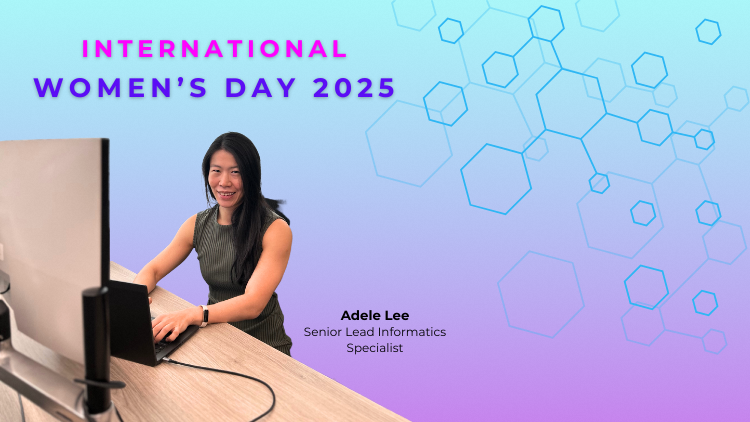
In conjunction with International Women’s Day in March, we spotlight Adele’s remarkable journey – from providing crucial hands-on care to patients to driving digital innovation as a Senior Lead Informatics Specialist in HealthTech. However, a recurring challenge faced by nurses – tedious notetaking, at-times illegible writing from some doctors, and manual documentation – sparked a new interest: leveraging digital technology to improve patient care efficiency. Today, in her role at Synapxe’s Clinical Informatics Department, Adele applies her deep understanding of patient care to bridge doctors and nurses with tech teams and create optimised digital solutions that enhance healthcare delivery.
Adele’s story is a testament to the power of adaptability and the growing impact of women in tech. In this interview, she shares her motivations for transitioning into HealthTech, the fulfilment she has found in her role, and insights on empowering more women to break into the tech industry.
Can you share more about your role and expertise?
As a Clinical Informatics Specialist, I work closely with both healthcare and IT professionals to ensure patient care services can operate efficiently, and ultimately enhance the health of people in Singapore. Together with my team, we provide key insights into the challenges healthcare professionals face and collaborate with relevant stakeholders to design and implement innovative solutions.
In essence, Clinical Informatics serves as a bridge between healthcare and IT, enabling both fields to communicate in the same “language” and work seamlessly together. By speaking with medical professionals to understand their needs and then working with IT teams to bring solutions to life, we ensure technology aligns with real-world healthcare challenges.
Do you need to have a technical background?
No, strong technical skills are not a prerequisite. At Synapxe, Clinical Informaticians often come from medical backgrounds with valuable clinical work experience, which helps ensure that digital solutions are both feasible and effective in real-world clinical settings. While technical skills are still important, they – along with other essential soft skills like teamwork, problem-solving and communication – are primarily developed on the job.
What drew you into joining HealthTech?
My medical training and on-the-ground experience as a nurse opened my eyes to daily struggles that healthcare professionals face in delivering the best possible care for patients. One of the frustrating issues I encountered was deciphering the illegible handwriting of some doctors' and the seemingly endless task of report writing. This motivated me to explore digitising medical records – eliminating handwritten notes while ensuring accurate and systematic information capture. Determined to explore this further, I volunteered with the hospital IT team while I was still a junior nurse to discover and actualise the different ways that paper records could be digitised.
How did your nursing colleagues react to the career switch?
At first, my nursing colleagues were shocked by my interest in HealthTech, especially when I shared that I intended to pursue it as a career. Some were concerned that years of practical medical skills would go to waste. Similarly, I also understood that transitioning into HealthTech meant stepping away from direct care for patients. However, I saw it as an opportunity to create a broader impact, improving healthcare on a much larger scale through digital innovation.
What is your superpower as a woman working in HealthTech?
My transition from nursing to HealthTech would not have been possible without adaptability, especially in the face of rapidly changing technologies. Reflecting on my journey, I found inspiration in Dr. Caroline Hargrove, a renowned inventor for the first Formula 1 (F1) simulator. She eventually became the Chief Technological Officer of her own HealthTech company, where she leveraged on F1 technologies and used AI to create telehealth solutions.
What has your experience been like working in tech, a traditionally male-dominated industry?
Having worked in both frontline healthcare and technology, I’ve seen that it can be intimidating for some women to step into these fields. However, my experience in Clinical Informatics has shown that this is changing – there is a growing recognition of the value that diverse perspectives bring into HealthTech. In fact, 70% of my department comprises women.
Through collaboration with others, including other passionate like-minded innovators, I’ve cultivated an out-of-the box approach to problem-solving and developed an innovative mindset towards improving patient care on a larger scale.
Can you share some words of advice for aspiring women in tech?
For women, especially those coming from caring professions like nursing, transitioning into the tech field can be a meaningful and rewarding experience. I encourage the women who are starting out in HealthTech to hold onto your purpose and trust in your skills and abilities. At Synapxe, fresh ideas are always welcomed, so don’t hesitate to share your insights. More importantly, advocate for yourself – whether it’s for career advancement, work-life balance or upskilling.
How can we inspire more young women to explore careers in HealthTech?
I hope to see more young girls take the bold step into HealthTech. By sharing more inspirational success stories – just as Dr Halgrove’s journey inspired me – and through introducing HealthTech exposure in schools, we can spark interest and awareness among more young women to explore careers in this field. The future of healthcare innovation relies on diverse talents and perspective, and I look forward to seeing more women shape the industry in the years to come.
At Synapxe, the national HealthTech agency, it’s more than just a job – it’s a fulfilling journey that allows you to shape your career while building HealthTech for public good. If you have a passion to shape the future of HealthTech in Singapore, find out more at https://www.synapxe.sg/careers.
